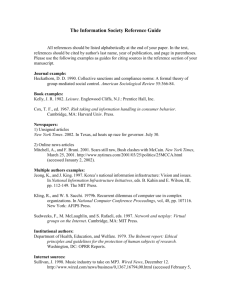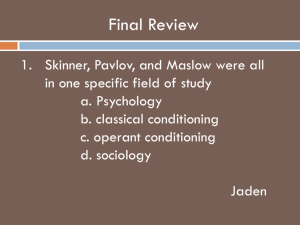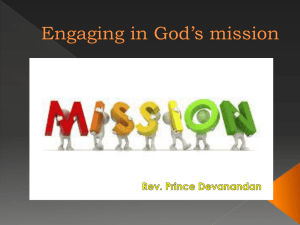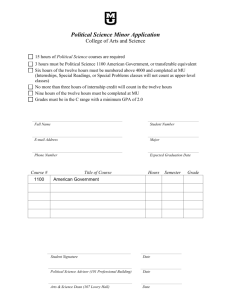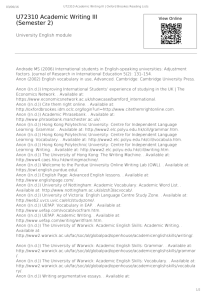No part of this text may be reproduced, stored - Al-Anon
advertisement
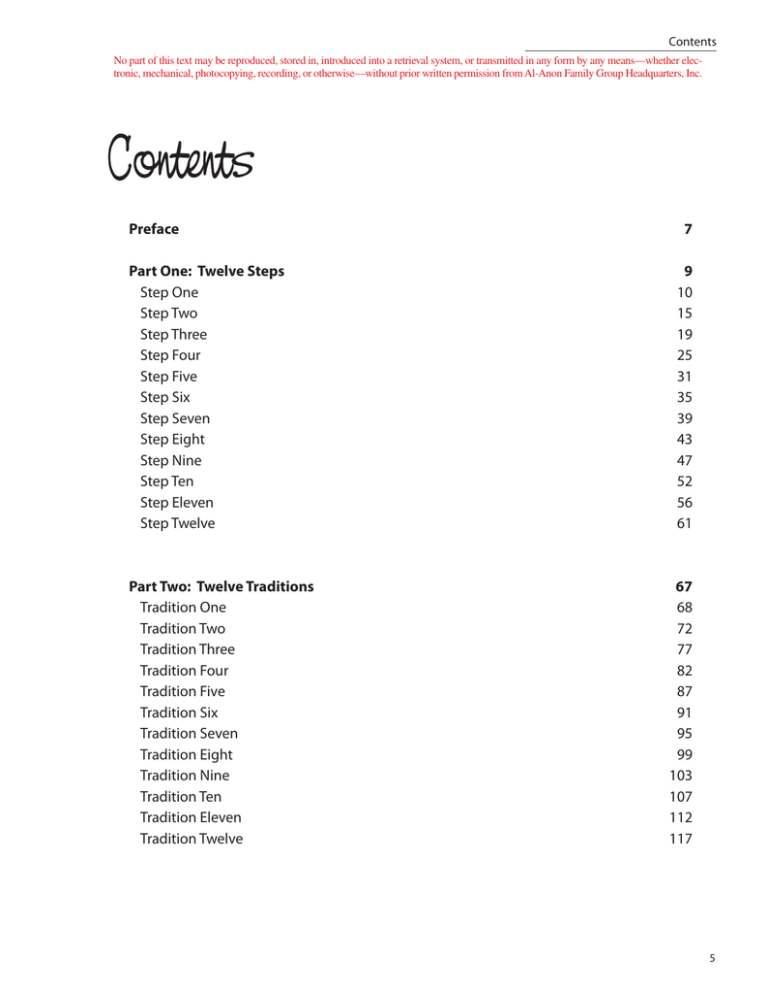
Contents No part of this text may be reproduced, stored in, introduced into a retrieval system, or transmitted in any form by any means—whether elec‑ tronic, mechanical, photocopying, recording, or otherwise—without prior written permission from Al‑Anon Family Group Headquarters, Inc. Contents Preface7 Part One: Twelve Steps Step One Step Two Step Three Step Four Step Five Step Six Step Seven Step Eight Step Nine Step Ten Step Eleven Step Twelve Part Two: Twelve Traditions Tradition One Tradition Two Tradition Three Tradition Four Tradition Five Tradition Six Tradition Seven Tradition Eight Tradition Nine Tradition Ten Tradition Eleven Tradition Twelve 9 10 15 19 25 31 35 39 43 47 52 56 61 67 68 72 77 82 87 91 95 99 103 107 112 117 5 Reaching for Personal Freedom No part of this text may be reproduced, stored in, introduced into a retrieval system, or transmitted in any form by any means—whether elec‑ tronic, mechanical, photocopying, recording, or otherwise—without prior written permission from Al‑Anon Family Group Headquarters, Inc. Part Three: Twelve Concepts of Service Concept One Concept Two Concept Three Concept Four Concept Five Concept Six Concept Seven Concept Eight Concept Nine Concept Ten Concept Eleven Concept Twelve 6 123 124 127 132 136 139 145 149 152 156 159 164 168 Preface No part of this text may be reproduced, stored in, introduced into a retrieval system, or transmitted in any form by any means—whether elec‑ tronic, mechanical, photocopying, recording, or otherwise—without prior written permission from Al‑Anon Family Group Headquarters, Inc. Preface Al‑Anon Family Groups has three Legacies: recovery through the Twelve Steps, unity through the Twelve Traditions, and service through the Twelve Concepts of Service. They are the spiritual foundation of our program. Each offers opportunities for healing and personal growth. For many of us, however, the power and beauty of the Legacies were not immediately apparent. At the beginning of our recovery from the effects of someone else’s problem drinking, we may have found the Steps valuable, but may not have realized how they could apply to other aspects of our lives. Similarly, as we grew in the program, we might have understood that the Traditions could guide us in solving problems within our Al‑Anon groups, and that the Concepts could be applied to problems at the world service level. We had yet to discover how the principles within the Traditions and the Concepts could be applied, at a deeper level, to our personal lives. Although the Legacies may be difficult to understand at first, with time and continued study our percep‑ tion of them gradually changes. The depth of their wisdom gives us an ever-growing, evolving understand‑ ing of the Al‑Anon program and the ways we can apply it “in all our affairs.” The more we learn from them, the more we realize how much there is yet to learn. Each Step, Tradition, and Concept can be studied individually, but it is important to remember that they are all part of an integrated whole. Their principles build upon each other and are interconnected. Most of us, however, begin by studying the Steps in their given order, eventually moving on to the Traditions and the Concepts. In Al‑Anon, however, we are each free to study the Legacies in the manner of our own choosing. Ultimately, the way we approach the Legacies is not as important as the fact that we are willing to make that commitment to our personal growth in Al‑Anon. Reaching for Personal Freedom can be used in group discussion or for personal study. Each chapter begins with a brief introduction of a particular Step, Tradition, or Concept. This introduction is followed by several personal stories, in which Al‑Anon members share how they have applied that Legacy to their personal lives. These stories come from postings shared over a four-year period on the English, French, and Spanish Legacy blogs on the Al‑Anon Members’ Web site. Related questions follow each story. The most essential part of this workbook is our personal response to these questions. As we write our an‑ swers and participate in this process, we become co-authors of the workbook. As we proceed, this workbook becomes a record of our personal path to recovery, while it also connects us to a fellowship-wide process that we have in common with other Al‑Anon members around the world. We hope that this workbook will provide new opportunities to apply the wisdom within Al‑Anon’s three Legacies to the challenges of daily living. When we open ourselves to the spiritual principles in these Lega‑ cies, we can find abundant possibilities for growth and fulfillment. 7 Reaching for Personal Freedom No part of this text may be reproduced, stored in, introduced into a retrieval system, or transmitted in any form by any means—whether elec‑ tronic, mechanical, photocopying, recording, or otherwise—without prior written permission from Al‑Anon Family Group Headquarters, Inc. 8 Twelve Steps No part of this text may be reproduced, stored in, introduced into a retrieval system, or transmitted in any form by any means—whether elec‑ tronic, mechanical, photocopying, recording, or otherwise—without prior written permission from Al‑Anon Family Group Headquarters, Inc. Twelve Steps 1. We admitted we were powerless over alcohol—that our lives had become unmanageable. 2. Came to believe that a Power greater than ourselves could restore us to sanity. 3. Made a decision to turn our will and our lives over to the care of God as we understood Him. 4. Made a searching and fearless moral inventory of ourselves. 5. Admitted to God, to ourselves, and to another human being the exact nature of our wrongs. 6. Were entirely ready to have God remove all these defects of character. 7. Humbly asked Him to remove our shortcomings. 8. Made a list of all persons we had harmed, and became willing to make amends to them all. 9. Made direct amends to such people wherever possible, except when to do so would injure them or others. 10.Continued to take personal inventory and when we were wrong promptly admitted it. 11.Sought through prayer and meditation to improve our conscious contact with God as we understood Him, praying only for knowledge of His will for us and the power to carry that out. 12.Having had a spiritual awakening as the result of these steps, we tried to carry this message to others, and to practice these principles in all our affairs. 9 Reaching for Personal Freedom No part of this text may be reproduced, stored in, introduced into a retrieval system, or transmitted in any form by any means—whether elec‑ tronic, mechanical, photocopying, recording, or otherwise—without prior written permission from Al‑Anon Family Group Headquarters, Inc. Step One We admitted we were powerless over alcohol—that our lives had become unmanageable. For those affected by the disease of alcoholism, Step One can be a daunting task. Because our thinking is often distorted, we can fall prey to the illusion of control. In trying to control the alco‑ holic’s drinking and behavior, our own lives become unmanageable. When we admit our powerlessness, it does not mean we are helpless. In accepting the reality of our situations, we begin to realize what we can and cannot change. Through this acceptance, we gain personal power and freedom. nnnnnnnn My life was unmanageable I was drowning in a sea of alcoholic craziness. I was hurting and hopeless. However, it was still hard for me to accept the idea of powerlessness. I was a great example of the non-alcoholic behaving in ways more unbelievable than the alcoholic. The alcoholic was intoxicated, and I was also intoxicated—with delusions of power and control. I would fix the alcoholic if I could just find the right combination of tricks. As I worked this Step and listened to longtime members, I came to understand that I can only change my‑ self. My life was unmanageable because, in addition to trying to manage the alcoholic’s life, I was also paying the bills, making excuses, bailing him out of jail and always believing it would be the last time, pouring out liquor or rationing it, and shaming or blaming him. Today on awakening I say, “Thank you for this new day. All power is yours, the God of my understanding. Lead me.” I think, pray, and make what I believe to be good choices for my life. I breathe rather than react. I do not try to manage anything or anyone. Because my Sponsor and the group believed in the program and walked me through it, I no longer feel hopeless or afraid. Why is it difficult to admit my powerlessness? How do the effects of the disease of alcoholism make my life unmanageable? 10 Twelve Steps No part of this text may be reproduced, stored in, introduced into a retrieval system, or transmitted in any form by any means—whether elec‑ tronic, mechanical, photocopying, recording, or otherwise—without prior written permission from Al‑Anon Family Group Headquarters, Inc. What keeps me holding on to the illusion that I have the power to change someone else? Letting go Because I was affected by alcoholism in my family, my thoughts and feelings became distorted. I thought I knew what was best for others, but in Al‑Anon I learned that many of my attempts to control others actually contributed to the problems I was trying to fix. I felt compelled to force solutions, but I ended up making many situations worse. My life became unmanageable, and I felt out of control. I was absolutely miserable before I came to Al‑Anon. Step One is the first step in an incredible journey. It shows me that alcoholism is a family disease and it puts my life back into proper perspective. I am completely powerless over many things, but I am not powerless over me. I am responsible for my actions, but not for anyone else’s thoughts or behavior. Step One puts the focus back on me, not on the alcoholic. My attempts to control others make my life crazy, but by letting go, I become free. Those around me find freedom to make their own mistakes and face their own consequences. Step One also helps me love the person and accept alcoholism as a disease. Alcoholism is like a spider web. It is almost invisible, yet it affects anyone who comes in contact with it. This disease spreads through families, twisting relationships and making everyone sick. In Al‑Anon, I have learned to detach with love and put my‑ self first. Funny how it works—by letting go of others, I can experience an even greater personal power and freedom. In what ways does denial hamper my ability to let go of people, places, and situations? How does Step One change my perspective about the disease of alcoholism? 11 Reaching for Personal Freedom No part of this text may be reproduced, stored in, introduced into a retrieval system, or transmitted in any form by any means—whether elec‑ tronic, mechanical, photocopying, recording, or otherwise—without prior written permission from Al‑Anon Family Group Headquarters, Inc. Finding acceptance in Step One Knowing I am powerless, and accepting powerlessness are two different matters. I knew I was powerless when I walked into my first meeting. I was so angry about not being able to change someone else’s behavior. Trying to change him made my life unmanageable, because I had no time for the house, my work, a spiritual life, or myself. I was obsessed with trying to fix the situation. However, once I learned about alcoholism and truly realized I was powerless, I set about making my life better. Acceptance has been my pathway to peace. How do I determine I am powerless over someone else’s behavior? The power of the Serenity Prayer Before I ever entered the rooms of Al‑Anon, I knew I was powerless over alcohol and the alcoholic’s drinking. What I continue to struggle with is my powerlessness over people, places, and things. For me, the best tool in this struggle is the Serenity Prayer. Whenever I find myself trying to change someone or something, I am reminded to walk myself through the prayer. To accept the things I cannot change, I look at what I am trying to do and accept the impossibility of it. To have the courage to change the things I can, I determine what I can do differently and pray for the willing‑ ness and ability to change. To know the difference, I pray for wisdom to recognize what I can and cannot change. These struggles and the discord created are really of my own making. With the help of Al‑Anon, the Twelve Steps, the Serenity Prayer, and my Higher Power, I get better “One Day at a Time.” In what ways do I continue to struggle with powerlessness? 12
